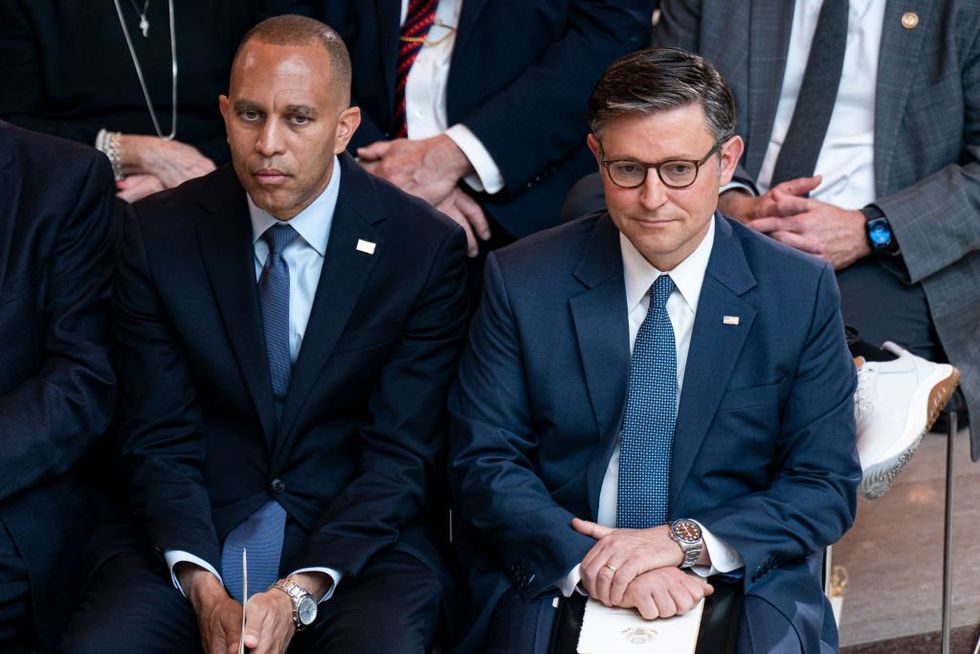Johnson’s ‘victories’: GOP splits, Dems carry
Eleven bills and counting. That’s how many pieces of major legislation Speaker of the House Mike Johnson (R-La.) has passed with the support of more Democrats than Republicans in his time in office. One for every month he’s had the job. Most recently, on Wednesday night, he passed a three-month continuing resolution to fund the government until December. In contrast, Johnson has accomplished almost nothing that Democrats haven’t supported. Let’s look at specifics. They give you a good look at what the uniparty really cares about. (Spoiler alert: It’s not what a lot of Republican voters care about.) First up, they care about spending huge amounts of your money. Second, they care about war in Ukraine. Third, they care about spying on former President Donald Trump (and you). And finally, they care about George Santos. The first Democrat-led spending bill came quickly into Johnson’s tenure: November 2023, less than a month after he assumed the gavel. Johnson promised to break the fight into two parts, giving Democrats what they wanted and then, after the leverage was gone, picking a much-needed fight on border enforcement. While 93 of the 95 “no” votes came from his own party, the CR funding the government until January passed with 209 Democratic votes and 127 Republican votes. Predictably, the border fight came to naught, and the speaker promised to actually battle it out with the National Defense Authorization Act. While this sort of uniparty kumbaya may be business as usual behind the scenes in DC, it’s unusual to see it practiced so openly and on the record in the House. December came soon enough, but guess what? No fight. This was also predictable. Too many Republican lawmakers worship at the altar of the Pentagon (and the permanent defense industry making billions from it) to ever really have a proper fight over the NDAA. It doesn’t matter that Defense Department leadership and brass have largely devoted themselves to radical Democratic social engineering and critical race theory while at the same time losing wars. If they want money, they get it. And so, on Dec. 14, Johnson passed the NDAA with 163 Democratic yeas and just 147 Republican yeas. It was stripped of any and all measures trying to rein in the Pentagon’s liberal Democratic excesses. In their place, a provision extending the Foreign Intelligence Surveillance Act, which the intelligence community used to spy on and sabotage the last Republican president, was added. A whopping 118 Republicans voted no. See you in the new year. Then came the January spending “fight.” Johnson had vowed to take a strong stand, aiming to push through 2023 and start fresh. But, as expected, he didn’t. The House suspended the rules once again, passing a CR to extend funding until March. The vote saw 107 Republicans in favor, 106 against, and 207 Democrats voting yes. After that, Johnson took a quick detour to tax reform. This is something Republicans can usually get behind, but while the moves fulfilled a number of promises Republicans had made to businesses, many couldn’t shake the feeling that it was tailored to K Street lobbyists while Main Street constituents were suffering. More, Democrats included tax credits for illegal immigrants — part of their steady march toward normalizing and justifying mass amnesty. It passed with 169 Republicans yeas and 188 Democratic yeas. But time was running short on that March CR, and Congress had yet to pass a massive, disgusting “omnibus.” (If this seems like a lot of continuing resolutions, it's because Congress hasn’t passed an actual budget by the books since 1996 — before at least one current member was even born.) This one passed with, once again, more Democrats than Republicans. This time: 207 Democratic and 113 Republican yeas to 97 Republican nays. Next came the omnibus bills. Congress was so fond of the idea that it passed two. The first passed with 207 Democratic votes and a mere 132 Republican votes. The second had 185 Democratic votes and just 101 Republican votes. Next up was FISA. Remember FISA? It’s the sort of intelligence tool the state promised to use only against terrorists and other bad guys but then ended up using against all sorts of domestic opponents. Trump remembers FISA. Anyway, this one should have been a slam-dunk “no” from the party the state tried to take down with FISA, but then to assume that, you’d be underestimating just how sycophantic the GOP’s relationship with the intelligence and defense communities is. Johnson flipped on his previous anti-FISA votes, and the reauthorization passed in April with 147 Democratic and 126 Republican yes votes. That same month, uniparty leadership played on Republican devotion to the foreign country of Israel and Democratic devotion to the foreign country of Ukraine, packaging security bills for both with one for countering China in the Indo-Pacific. Johnson won over his Democratic pals by stripping out anything about defend


Eleven bills and counting. That’s how many pieces of major legislation Speaker of the House Mike Johnson (R-La.) has passed with the support of more Democrats than Republicans in his time in office. One for every month he’s had the job.
Most recently, on Wednesday night, he passed a three-month continuing resolution to fund the government until December. In contrast, Johnson has accomplished almost nothing that Democrats haven’t supported.
Let’s look at specifics. They give you a good look at what the uniparty really cares about. (Spoiler alert: It’s not what a lot of Republican voters care about.)
First up, they care about spending huge amounts of your money. Second, they care about war in Ukraine. Third, they care about spying on former President Donald Trump (and you).
And finally, they care about George Santos.
The first Democrat-led spending bill came quickly into Johnson’s tenure: November 2023, less than a month after he assumed the gavel. Johnson promised to break the fight into two parts, giving Democrats what they wanted and then, after the leverage was gone, picking a much-needed fight on border enforcement. While 93 of the 95 “no” votes came from his own party, the CR funding the government until January passed with 209 Democratic votes and 127 Republican votes. Predictably, the border fight came to naught, and the speaker promised to actually battle it out with the National Defense Authorization Act.
While this sort of uniparty kumbaya may be business as usual behind the scenes in DC, it’s unusual to see it practiced so openly and on the record in the House.
December came soon enough, but guess what? No fight. This was also predictable. Too many Republican lawmakers worship at the altar of the Pentagon (and the permanent defense industry making billions from it) to ever really have a proper fight over the NDAA. It doesn’t matter that Defense Department leadership and brass have largely devoted themselves to radical Democratic social engineering and critical race theory while at the same time losing wars. If they want money, they get it.
And so, on Dec. 14, Johnson passed the NDAA with 163 Democratic yeas and just 147 Republican yeas. It was stripped of any and all measures trying to rein in the Pentagon’s liberal Democratic excesses. In their place, a provision extending the Foreign Intelligence Surveillance Act, which the intelligence community used to spy on and sabotage the last Republican president, was added. A whopping 118 Republicans voted no. See you in the new year.
Then came the January spending “fight.” Johnson had vowed to take a strong stand, aiming to push through 2023 and start fresh. But, as expected, he didn’t. The House suspended the rules once again, passing a CR to extend funding until March. The vote saw 107 Republicans in favor, 106 against, and 207 Democrats voting yes.
After that, Johnson took a quick detour to tax reform. This is something Republicans can usually get behind, but while the moves fulfilled a number of promises Republicans had made to businesses, many couldn’t shake the feeling that it was tailored to K Street lobbyists while Main Street constituents were suffering. More, Democrats included tax credits for illegal immigrants — part of their steady march toward normalizing and justifying mass amnesty. It passed with 169 Republicans yeas and 188 Democratic yeas.
But time was running short on that March CR, and Congress had yet to pass a massive, disgusting “omnibus.” (If this seems like a lot of continuing resolutions, it's because Congress hasn’t passed an actual budget by the books since 1996 — before at least one current member was even born.) This one passed with, once again, more Democrats than Republicans. This time: 207 Democratic and 113 Republican yeas to 97 Republican nays.
Next came the omnibus bills. Congress was so fond of the idea that it passed two. The first passed with 207 Democratic votes and a mere 132 Republican votes. The second had 185 Democratic votes and just 101 Republican votes.
Next up was FISA. Remember FISA? It’s the sort of intelligence tool the state promised to use only against terrorists and other bad guys but then ended up using against all sorts of domestic opponents. Trump remembers FISA. Anyway, this one should have been a slam-dunk “no” from the party the state tried to take down with FISA, but then to assume that, you’d be underestimating just how sycophantic the GOP’s relationship with the intelligence and defense communities is. Johnson flipped on his previous anti-FISA votes, and the reauthorization passed in April with 147 Democratic and 126 Republican yes votes.
That same month, uniparty leadership played on Republican devotion to the foreign country of Israel and Democratic devotion to the foreign country of Ukraine, packaging security bills for both with one for countering China in the Indo-Pacific. Johnson won over his Democratic pals by stripping out anything about defending our own country’s borders, and guess what: It passed with 165 Democratic yeas and just 151 Republican yeas.
The very next day, for good measure, Johnson sent even more money to Ukraine with the support of 101 Republicans and 210 Democrats. The Republican no votes came in at 112. Democratic nays? Zero.
And then you have Wednesday’s CR, which garnered 132 Republican votes but was driven across the finish line by 209 Democrats.
Oh, and let’s not forget George Santos. Between passing the NDAA and FISA in December, Republicans took time to expel a Republican for being a liar and possibly a sociopathic con artist, though his flair made him far more entertaining than the many other liars and con artists who voted to expel him. The vote mattered because Republicans held a slim majority and the seat would almost certainly flip to a Democrat in a special election. This, of course, made their stance seem even more principled than usual.
Anyway, that vote was contentious: 105 Republicans were in favor of expelling Santos and 112 were against. Unsurprisingly, Democrats came to the rescue, delivering 206 yeas for such a moral cause. Phew.
And that’s it. Eleven major votes the Democrats carried for their speaker. While this sort of uniparty kumbaya may be business as usual behind the scenes in D.C., and particularly in the Senate, it’s unusual to see it practiced so openly and on the record in the House. It’s a black mark against Johnson’s leadership but also against the House Republicans’ cohesiveness as an actual party.
“Can anyone name a single thing that extreme MAGA Republicans in the House have been able to do on their own to make life better for the American people?” Democratic House Leader Hakeem Jeffries asked reporters after the Wednesday CR. “A single thing? Just one?"
Political rhetoric aside, he’s right. I can’t really think of anything. You can certainly blame the slim Republican majority (and some of its more rebellious, camera-hungry members), but its more than that. To date myself, its reminiscent of the scene in Disney’s “ Aladdin” where seven sword-bearing guards cower in fear, pointing to the little monkey and yelling, “He’s got a sword!”
That’s a cartoon, but as far as Republican negotiations go, it’s real life. The House of Representatives has a sword but lacks the will to use it for leverage in real time. So the Democrats win again and again.
The next test comes in December. That’s when the actual spending battle comes in. If Trump wins in November, it will literally decide whether he can govern in his first year — or whether Democrats will be allowed to box him in to their priorities. Johnson has promised a fight, and it would be nice to see one for once. The new chairman of the Freedom Caucus told the Beltway Brief this week that the caucus would be challenging Johnson’s position in January if he goes back on that pledge.
But if history is our guide, it’s not looking so good.
Sign up for Bedford’s newsletter
Sign up to get Blaze Media senior politics editor Christopher Bedford's newsletter.
IN OTHER NEWS
Mitch McConnell makes common cause with Zelenskyy as he campaigns for Democrats
Volodymyr Zelenskyy quickly captured Republican attention during his U.S. tour by openly attacking the party’s nominee, Donald Trump, and his running mate, Sen. JD Vance (R-Ohio). Rumor has it that Senate Minority Leader Mitch McConnell (R-Ky.), who has oddly made Ukraine a cornerstone of his legacy, quietly gave Zelenskyy the green light, boosting the foreign leader’s confidence to meddle in such a close election.
That rumor seemed a little far-fetched until Zelenskyy arrived in Washington. The House of Representatives had already responded to the provocation, opening an investigation into the use of Air Force resources to ferry around a foreign surrogate for Kamala Harris. The investigation will go nowhere, as most Republican investigations do, but it at least staked out the House’s position. Meanwhile on the other side of the building, McConnell staked out his position — guiding the Ukrainian leader around Capitol Hill shoulder to shoulder.
The outgoing leader’s brashness against his party’s nominee fits with the man — and fits with his intention to bind a potential 2025 Trump administration’s foreign policy by appropriating continued taxpayer funding to Ukraine in a massive, disgusting December omnibus bill. His colleague, Sen. Lindsey Graham (R-S.C.), has gone so far as to propose binding the next three administrations’ foreign policy toward Russia with a 10-year war funding bill.
It’s hard not to wonder what the future might look like if more Republican senators showed this type of devotion to American security — and the American worker.
Breitbart: McConnell invites Never-Trumper to push more Pentagon spending at GOP Senate lunch
Originally Published at Daily Wire, World Net Daily, or The Blaze
What's Your Reaction?
































































































